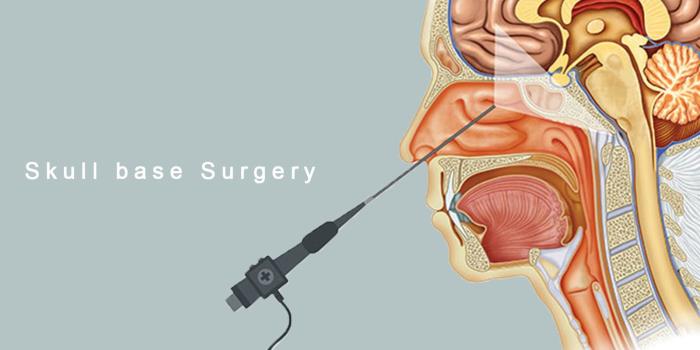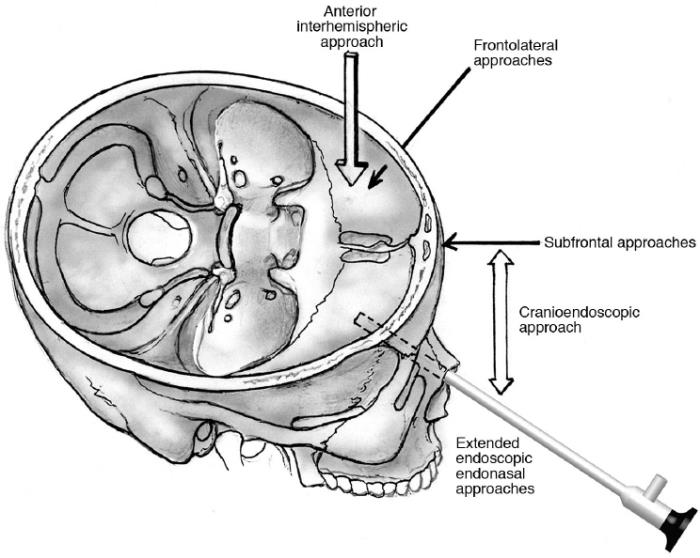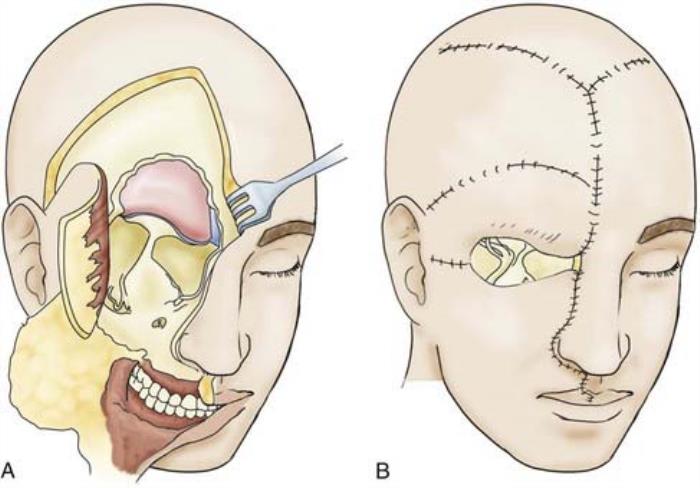Skull base surgery in India has become a prominent field, offering advanced techniques and treatments for complex conditions affecting the skull base. With renowned hospitals and skilled neurosurgeons, India provides cutting-edge care and innovative solutions for patients requiring intricate surgical procedures in this critical area.
Understanding Skull Base Surgery
What is Skull Base Surgery and How Does it Work?
Skull base surgery is a specialized surgical procedure aimed at treating conditions affecting the base of the skull, including tumors, vascular malformations, and structural abnormalities. This type of surgery involves accessing the base of the skull through various approaches, such as endoscopic or open techniques, to remove or repair problematic tissues while minimizing damage to surrounding structures.

Skull base surgery typically begins with precise imaging and diagnostic evaluations to plan the optimal approach. Surgeons may use endoscopic tools or make strategic incisions to reach the affected area. The procedure focuses on removing or treating the abnormal growths while preserving crucial nerves and blood vessels
When is Skull Base Surgery Necessary?
Skull base surgery is necessary when dealing with tumors, vascular malformations, or structural abnormalities at the base of the skull that impact critical functions or pose significant health risks. It is often recommended when less invasive treatments are insufficient or when precision access is required to address complex issues effectively.
Different Types of Skull Base Surgeries
Different types of skull base surgeries include endoscopic approaches, which use small instruments and a camera to access the area through minimal incisions, and open approaches, which involve larger incisions to directly access and treat complex conditions. Each type is chosen based on the location, size, and nature of the problem, aiming to minimize risk and optimize outcomes.
The Skull Base Surgery Procedure
Pre-Surgery Evaluation Process
The pre-surgery evaluation process for skull base surgery involves comprehensive diagnostic assessments, including advanced imaging techniques like MRI and CT scans to precisely locate and characterize the problem. Patients also undergo physical examinations and may have consultations with specialists to assess overall health and surgical risks. This thorough evaluation helps in planning the most effective surgical approach and ensuring optimal outcomes.
Choosing the Right Type of Skull Base Surgery
Choosing the right type of skull base surgery involves evaluating the specific characteristics of the condition, including its location, size, and complexity. Surgeons consider factors such as the patient's overall health, potential risks, and the goals of the surgery. Options may include endoscopic techniques for less invasive access or open approaches for more direct intervention, aiming to balance effectiveness with minimal impact on surrounding structures.

Detailed Surgical Procedure for Skull Base Surgery
The detailed surgical procedure for skull base surgery involves initial imaging and planning to identify the precise location of the issue. Surgeons then use either an endoscopic approach with small incisions and specialized instruments or an open approach with larger incisions to access the base of the skull. The targeted treatment, whether removal of tumors or correction of abnormalities, is performed with careful attention to surrounding nerves and blood vessels, followed by meticulous closure and post-operative care.
Post-Surgery Care and Recovery
Post-surgery care for skull base surgery involves careful monitoring in a specialized recovery unit, pain management, and gradual rehabilitation to ensure optimal healing. Patients typically follow a tailored recovery plan, including medications, physical therapy, and follow-up visits to assess progress and address any complications, aiming for a full recovery while managing any potential side effects.
Top Hospitals for Skull Base Surgery in India
Best hospitals for skull base surgery in India include Apollo Hospitals in Chennai and Delhi, known for their advanced surgical techniques and experienced neurosurgeons; Fortis Memorial Research Institute in Gurgaon, offering state-of-the-art facilities and comprehensive care; and Medanta – The Medicity in Gurgaon, renowned for its specialized skull base surgery programs and cutting-edge technology.
Success Rates and Survival Statistics for Skull Base Surgery in India
Success rates for skull base surgery in India are generally high, with many centers reporting favorable outcomes for both benign and malignant conditions. Survival statistics vary based on the type and stage of the condition, but advancements in surgical techniques and post-operative care contribute to improved prognosis. Hospitals like Apollo and Medanta often provide detailed success rates and survival statistics based on specific procedures and patient profiles.
Legal and Ethical Considerations for Skull Base Surgery in India
Legal and ethical considerations for skull base surgery in India include obtaining informed consent, ensuring patient confidentiality, and adhering to ethical standards in surgical practice. Hospitals must comply with regulatory guidelines and provide transparent information about risks, benefits, and alternatives. Ethical practices also involve considering patient autonomy and delivering care that aligns with the best clinical outcomes and patient values.
Cost of Skull Base Surgery in India
The cost of skull base surgery in India varies widely depending on the complexity of the procedure, the hospital, and the surgeon’s expertise. On average, it ranges from INR 2 lakh to INR 6 lakh. This cost typically includes pre-surgery evaluations, the surgical procedure itself, and post-operative care, though additional expenses for specialized treatments or extended stays may apply.
Explore a detailed breakdown of skull base surgery cost in India by visiting our in-depth guide skull base surgery cost in India.
Best Skull Base Surgery Doctors in India
India is recognized for its exceptional skull base surgery specialists, including Dr. A. R. B. Rao, Dr. Rakesh Sinha, and Dr. Neeraj Kumar. These esteemed surgeons, practicing at top institutions like AIIMS, Apollo Hospital, and Fortis Hospital, are known for their advanced techniques and successful outcomes. Their dedication to innovative surgical methods ensures effective treatment for complex skull base conditions, providing patients with the best possible care.
Preparing for Skull Base Surgery
Lifestyle Changes Before Skull Base Surgery
Before skull base surgery, lifestyle changes may include adopting a healthy diet, quitting smoking, and avoiding alcohol to enhance overall health and support recovery. Patients are also advised to manage chronic conditions, follow pre-surgery instructions regarding medications, and engage in regular physical activity as permitted to improve surgical outcomes and reduce complications.
Medications and Treatments Required for Skull Base Surgery Patients
Patients undergoing skull base surgery typically require medications such as pain relievers, antibiotics to prevent infection, and corticosteroids to reduce inflammation. Pre-operative treatments may also include medications to manage underlying conditions and specific instructions for adjusting current medications. Post-surgery, ongoing treatments often involve follow-up medications for pain management and anti-inflammatory purposes, alongside rehabilitation therapies to support recovery.

Importance of Support Systems and Counseling for Skull Base Surgery Patients
Support systems and counseling are crucial for skull base surgery patients, as they provide emotional support, help manage stress, and facilitate a smoother recovery. Family, friends, and professional counselors play a vital role in addressing psychological challenges, guiding patients through the recovery process, and ensuring adherence to treatment plans. This support contributes to improved overall outcomes and quality of life during the recovery period.
Life After Skull Base Surgery
Recovery Process After Skull Base Surgery
The recovery process after skull base surgery involves careful monitoring in the hospital, followed by gradual home recovery. Patients should adhere to prescribed medications, engage in recommended physical therapy, and attend follow-up appointments to assess healing and manage any complications. A balanced diet, adequate rest, and support from healthcare professionals are key to achieving a successful recovery and regaining normal function.
Long-term Care and Monitoring After Skull Base Surgery
Long-term care and monitoring after skull base surgery involve regular follow-up visits to evaluate recovery progress and detect any potential issues early. Patients may require ongoing imaging studies, medication adjustments, and physical therapy to support healing and functionality. Continuous assessment helps manage any long-term effects and ensures sustained health and well-being.
Potential Risks and Complications of Skull Base Surgery
Potential risks and complications of skull base surgery include infection, bleeding, and cerebrospinal fluid leaks. Patients may also experience neurological issues such as vision or hearing changes, as well as issues with balance or motor functions. Early detection and management of these complications are crucial for minimizing long-term effects and ensuring optimal recovery.
Latest Advancements in Skull Base Surgery
Minimally Invasive Techniques in Skull Base Surgery
Minimally invasive techniques in skull base surgery involve using endoscopic approaches that require only small incisions and specialized instruments to access and treat conditions. These techniques offer benefits such as reduced recovery time, lower risk of infection, and minimized impact on surrounding tissues compared to traditional open surgery. They are particularly effective for accessing difficult-to-reach areas at the base of the skull with greater precision.
Use of Advanced Imaging for Better Outcomes
Advanced imaging technologies, such as MRI and CT scans, play a crucial role in skull base surgery by providing detailed, high-resolution views of the affected area. These imaging tools enhance surgical planning, allowing for precise targeting of tumors or abnormalities while preserving critical structures. Improved imaging leads to better outcomes through more accurate diagnoses, optimized surgical approaches, and effective post-operative monitoring.
Development of Advanced Surgical Tools
The development of advanced surgical tools has significantly enhanced skull base surgery by providing greater precision and control. Innovations such as robotic-assisted systems, high-definition endoscopes, and specialized navigation tools enable surgeons to perform complex procedures with improved accuracy and minimal invasiveness. These advancements contribute to better surgical outcomes, reduced recovery times, and a lower risk of complications.
Frequently Asked Questions (FAQs) about Skull Base Surgery
What is the success rate of skull base surgeries in India?
The success rate of skull base surgeries in India is generally high, thanks to advanced medical care and experienced surgical teams. Many centers report favorable outcomes for both benign and malignant conditions, contributing to improved patient prognosis and quality of life.
How long is the hospital stay after skull base surgery?
The hospital stay after skull base surgery typically ranges from 5 to 10 days, depending on the complexity of the procedure and the patient’s recovery progress. This period allows for monitoring, initial recovery, and managing any immediate post-surgical needs.
What is the cost of skull base surgery in India?
The cost of skull base surgery in India varies from ₹5 lakh to ₹15 lakh, depending on the specific procedure, the hospital, and the expertise of the surgical team. This range includes pre-operative evaluations, the surgery itself, and post-operative care.
What are the eligibility criteria for skull base surgery?
Eligibility for skull base surgery depends on factors such as the type and stage of the condition being treated, overall health, and the patient’s ability to undergo surgery. A thorough evaluation by a specialist is necessary to determine if surgery is the appropriate option.
What is the recovery time after skull base surgery?
Recovery time after skull base surgery typically ranges from 6 to 12 weeks, depending on the complexity of the procedure and individual patient factors. This period involves gradual healing, rehabilitation, and follow-up care to ensure optimal recovery.
What are the risks and complications associated with skull base surgeries?
Risks and complications of skull base surgeries may include infection, bleeding, and potential nerve damage. Early detection and management of these issues are crucial for minimizing long-term effects and supporting a successful recovery.
How do I find a suitable hospital for skull base surgery in India?
To find a suitable hospital for skull base surgery in India, consult with your doctor and research top hospitals known for their expertise in neurosurgery. Look for facilities with advanced technology, experienced surgeons, and a strong track record in handling complex cases.
What kind of post-surgery care is required after skull base surgery?
Post-surgery care for skull base surgery includes taking prescribed medications, attending regular follow-up check-ups, and engaging in rehabilitation therapies as needed. Proper care helps manage pain, support healing, and monitor for any potential complications.
Are skull base surgeries covered by insurance in India?
Coverage for skull base surgeries by insurance in India varies depending on the insurance plan. It is important to check with your insurance provider to confirm whether the procedure is covered and understand the extent of the coverage provided.
Where can I find support groups for skull base surgery patients in India?
Support groups for skull base surgery patients in India can be found through hospitals, patient advocacy organizations, and online communities. These groups offer valuable emotional support, information, and connections with others undergoing similar experiences.
Discover the Best Neurosurgery Hospitals and Neurosurgeons in India
When it comes to brain and spine care, choosing the right hospital and specialist is essential. We�ve highlighted the top neurosurgery hospitals and neurosurgeons across India to ensure you receive the best care available.
Top Neurosurgery Hospitals in India
Find the leading centers for brain and spine care:
Best Neurosurgeons in India
Meet the top specialists in brain and spine surgery:
Get more indepth information on Neurology treatments and their costs.
Conclusion
Your brain and spine health deserve the best care. Explore the links above to learn more about the top neurosurgery hospitals and neurosurgeons in India.